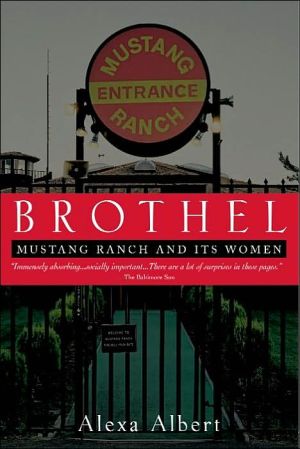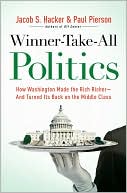Brothel: Mustang Ranch and Its Women
When Harvard medical student Alexa Albert conducted a public-health study as the Mustang Ranch brothel in Nevada, the only state in the union where prostitution is legal, neither she nor the brothel could have predicted the end result. Having worked with homeless prostitutes in Times Square, Albert was intimate with human devastation cause by the sex trade, and curious to see if Nevada’s brothels offered a less harmful model for a business that will always be with us. The Mustang Ranch has...
Search in google:
When Harvard medical student Alexa Albert conducted a public-health study as the Mustang Ranch brothel in Nevada, the only state in the union where prostitution is legal, neither she nor the brothel could have predicted the end result. Having worked with homeless prostitutes in Times Square, Albert was intimate with human devastation cause by the sex trade, and curious to see if Nevada’s brothels offered a less harmful model for a business that will always be with us. The Mustang Ranch has never before given an outsider such access, but fear of AIDS was hurting the business, and the Ranch was eager to get publicity for its rigorous standards of sexual hygiene. Albert was drawn into the lives of the women of the Mustang Ranch, and what began as a public-health project evolved into something more intimate and ambitious, a six-year study of the brothel ecosystem, its lessons and significance. The women of the Mustang Ranch poured their stories out to Albert: how they came to be there, their surprisingly deep sense of craft and vocation, how they reconciled their profession with life on the outside. Dr. Albert went as far into this world as it is possible to go — some will say too far — including sitting in on sessions with customers, and the result is a book that puts an unforgettable face on America’s maligned and caricatured subculture. Publishers Weekly Perhaps the most prominent legal brothel in Nevada, Mustang Ranch held mythical status in contemporary Western culture until it was shut down on racketeering charges in 1999. As a medical student, Albert was granted rare access to this intensely private world in order to conduct a study on condom use, and lived periodically at Mustang Ranch from 1993 to 1999. Her routine study soon deepened in tandem with her curiosity about the politics of prostitution and about the prostitutes themselves. In this straightforward account, she details the brothel regimen (from the women's relative captivity to what happens during various "parties") and explores the private lives of the women who work there, as well as those of the "johns" and the workers who service the Ranch. Yet the heart of the book lies in Albert's exploration of the sense of family that thrives in the brothel with all the fractious infighting, competition and camaraderie inherent in any community. Her short history of the legalization of prostitution in Nevada revolves around Joe and Sally Conforte who officially owned Mustang Ranch until charges of tax evasion forced Joe into hiding in South America in 1990 while illuminating the confluence of public opinion and economic forces that spurred legalization. Acknowledging her own feelings (which range from disgust to profound respect), Albert convincingly dispels myths about this mysterious world and provides a strong defense for the legalization of prostitution. Copyright 2001 Cahners Business Information.
Chapter I: The Opening\ The postmark read “Reno Nevada, 24 Dec 1992.” I stared at the envelope for a long moment before opening it. Reno? My mind was blank. Then it came to me: the brothel. For three and a half years, off and on, I had tried to convince a man named George Flint, executive director of the Nevada Brothel Association, to grant me permission to conduct a research study inside Nevada’s legal brothels, the only licensed houses of prostitution in America. My letters and telephone calls had been for naught; Flint stood firm that the brothel industry wasn’t available for a researcher’s examination. “Brothel people are very private people,” he had told me. “They don’t like people nosing around.”\ It had become a ritual to send him a card every year reminding him of my project. I had long ago stopped entertaining any serious hope that he would agree, so I was in a slight daze when I tore open the envelope and read: “Your holiday card arrived earlier today. There may come a time that we can do something substantive together. Call me sometime and we will talk. George Flint.”\ I first began to think seriously about Nevada’s legal brothels in 1989. I was an undergraduate and fascinated by public health issues; the AIDS crisis had exploded into mainstream public consciousness; and prostitution was the focus of national attention as public health officials hotly contested the role of sex workers in the transmission of HIV. In the context of that debate, I had learned that certain areas of Nevada licensed brothel prostitution, with specific ordinances established to safeguard the health and safety of the public. These controls were said to greatly reduce the dangers typically associated with street prostitution–violent crime, drug use, and disease transmission. Latex condoms were required for all brothel sexual activity, and women were tested regularly for sexually transmitted diseases, including HIV. Since HIV testing began in 1986, no brothel worker had tested positive, I was told, and the incidence of other STDs was negligible.\ Before I could reckon with the public health implications of this information, I had to get over my astonishment that one of our culture’s great taboos was legally sanctioned by one (and only one) American state. Why was this fact never made a national issue? What about the women? Prostitution carries with it a grave stigma; did being licensed and legal diminish that? Did legality assure these women legitimacy, even a sense of professionalism? The more I considered the human questions, the more they came to haunt me, and I found growing within me a desire to get inside this world and understand it. That the brothels were strictly off-limits to non- "working" women only goaded me further.\ That summer, I took an internship in family planning and human sexuality at Emory University that required me to develop a public health study. After a lot of thought and much grief from my family and husband, I submitted a proposal to investigate brothel prostitutes’ condom-use practices. Hard data on the efficacy of condom use in preventing HIV infection was scarce, and the issue was complicated by the very real problem of condom slippage and breakage. That hundreds of women in Nevada should be having multiple sexual partners every day without any reported HIV transmission was almost too good to be true. If I could verify it, and learn exactly what the women were doing right, I had a chance, I felt, to accomplish something important. I thought the brothels would surely cooperate with the project: it offered society valuable public health information, and it gave them validation as safe and responsible businesses.\ My naïveté was rubbed in my face when George Flint point-blank refused me entry. At least I wasn’t the only one; after doing a little more research, I realized how few outsiders had ever been permitted to investigate the brothel industry in any real depth. Prostitutes were kept on the premises behind locked electric gates, and visitors were surveilled before being buzzed in. Media coverage was very controlled; the brothels had been featured a few times on television programs like Donahue, Geraldo, and Jerry Springer, but the audience was shown only the most superficial aspects of the business.\ Needless to say, my astonishment was total when Flint wrote me three and a half years later to invite me to Nevada to conduct my research project on condom-use practices. Certainly, the project was still valid, and at this point in my life I was in the process of applying to medical school. I was put on guard, though, by something he said when we spoke by phone: “Anything positive that comes from a prestigious place like Emory helps to support our cause.” Was that what my study was doing? Was he in dire straits suddenly and desperate for PR? If so, did I want to help? Did I want to support brothel owners and promote the expansion of legalized prostitution in America? While I was curious to see whether legalized brothels actually provided prostitutes with more protection than illegal prostitution, I fundamentally believed prostitution was a dehumanizing, objectifying business that did women real damage. Was I being roped into being its booster?\ Flint went on to say, “It’s not going to be like breezing in and counting tomatoes or comparing prices in a grocery store. The working ladies are very private people. They don’t trust outsiders. You’re in for a real education, honey.” Suddenly, the study I’d written off was a reality, and my mind began to race. Absent any more information, nightmare scenarios multiplied. Who were these women who allowed themselves to be locked behind gates? Were they all drug addicts and survivors of heinous sexual abuse, like so many street prostitutes? Were they chained to beds, as prostitutes allegedly were in Thailand? Would they even agree to speak with me? Above all, did I have it in me to do this? Yes, I decided. I bought a plane ticket.\ My family didn’t help. They were even more uncomfortable than I was. As long as I wasn’t allowed inside, my interest in the project had been entertaining. But now I was headed to Nevada, and suddenly my parents wondered why I was so interested in an underworld teeming with criminals and degenerates. My husband’s parents were even more confused. Let us get this straight: You’re choosing to leave our son for an entire month to conduct research in a brothel? Do you secretly desire to become a prostitute? What are we going to tell our friends? Andy, my husband, had his own worries, my physical safety not the least among them.\ In the end, apprehension and all, I made that flight to Reno. Awaiting me at the Reno airport was a man named Marty who had been sent to pick me up and deliver me to Flint at a place called Chapel of the Bells. Flint was not only executive director of the Nevada Brothel Association, I learned, but a (retired) ordained minister as well. In fact, he owned one of Reno’s twelve wedding chapel businesses–and arguably the nicest, or at least the only freestanding one. (The others were storefronts.) With its whitewashed façade, faux stained-glass windows, and prominent cupola, Flint’s Chapel of the Bells looked more like Disney’s version of the gingerbread house in “Hansel and Gretel” than a wedding chapel.\ In the lobby, white lace-print paper lined the walls and a pattern of miniature flowers decorated the ceiling moldings like frosting on a wedding cake. An assortment of bridal bouquets, boutonnières, garter belts, and champagne flutes was showcased for newlyweds who wanted such traditional wedding frills. On the walls hung sobering certificates and plaques that authenticated George Flint’s maternal ancestors, the Treats, as descendants of the founders of New Jersey and Connecticut. Flint would later tell me that he could trace his family’s lineage all the way back to Charlemagne.\ While I waited for my audience with Flint, I watched a live feed on a closed-circuit television of a wedding in progress. A female minister was presiding over the marriage of a middle-aged Frenchman to a diminutive and considerably younger-looking Vietnamese bride who clearly spoke much less English than he did, which is to say, almost none.\ Finally Flint appeared. For nearly four years, I’d wondered what the brothel industry’s gatekeeper looked like. A flashy, gum-smacking, middle-aged street hustler with a cockeyed hairpiece and several heavy gold necklaces buried in dark chest hair is what I had expected. Instead, I saw a man in his early sixties, of ample proportions and intense civility. He wore tinted eyeglasses, and several expensive–but not gaudy–rings flashed from thick fingers. He wobbled a little as he walked, because of a serious leg injury. He looked safer, friendlier, and more polished than I’d imagined. I couldn’t help but see in my mind’s eye a smiling Midwestern televangelist wooing an admiring and loving audience.\ As he led me down to his basement office, he peppered me with unexpected questions about my family. Did I know my ancestry, he asked? Did I have any interest in genealogy? I admitted I hadn’t given it much thought–certainly not as much as he had. He told me about each of the family portraits hanging on the basement walls. His father had been a professional photographer and Flint confessed that he had inherited his passion for photography from his dad. In fact, George–he insisted I call him George rather than Mr. Flint or Reverend Flint–admitted to many passions, from travel and antiques to Napoleon and the embalming practices of morticians. I found myself nodding pleasantly and in half-disbelief as his stories rolled over me, delivered in the soothing cadences of a professional preacher.\ Suddenly, George changed the subject. “Why is it that women who were sexually aggressive before marriage, never want to give a guy oral sex after they’re married?” Did he expect me to answer that? George didn’t need an answer. The problem, he explained, lay in our society’s inability to communicate about sex. Men fundamentally wanted to be monogamous, he contended, but resorted to having affairs or going to brothels when they felt uncomfortable discussing their sexual fantasies with their wives. Then, warming to his other job as brothel lobbyist, he began to tick off a litany of reasons for legalizing prostitution.
1The Opening32An Institution343Breadwinners684Pride in One's Work955Entanglements1236Sisterhood1457Legalized, Not Legitimized1688An Extended Family2019Brothel.com22110Hooked244Epilogue261Acknowledgments267
\ From Barnes & NobleBarnes & Noble Discover Great New Writers\ A tenacious doctor with a sharp eye for detail brings us a unique and completely absorbing look at the world's oldest profession in Brothel. As an aspiring medical student with a keen interest in public health, Alexa Albert was shocked to learn that prostitution was legal in the state of Nevada. But what she found equally surprising was that Nevada's licensed brothels are remarkably free from the violence and drugs commonly associated with prostitution, and that the incidence of "entertainers" transmitting HIV and other STDs is virtually nonexistent. So, is legalized prostitution better for the working girls -- and the public -- than illegal prostitution? She was determined to find out. \ With astonishing determination, Dr. Albert traveled to Nevada to expose the day-to-day world of Nevada's houses of prostitution. As a guest at the legendary Mustang Ranch brothel, she met a colorful, often tragic set of characters. Readers are introduced to a number of women, many of whom are mothers and wives as well as prostitutes. We also meet a host of supporting players -- including George, a retired minister with the unlikely job of executive director of the Nevada Brothel Association (not to be confused with the NBA). Dr. Albert doesn't let the doors of the "bedrooms," where the women entertain their clients, keep her from her research, either. She goes behind them, playing "voyeur," as she wrestles with the question at the root of her exploration. Her account is both a bracing political discussion and a disarming view of a distinctive slice of life. (Summer 2001 Selection)\ \ \ \ \ \ Publishers Weekly - Publisher's Weekly\ Perhaps the most prominent legal brothel in Nevada, Mustang Ranch held mythical status in contemporary Western culture until it was shut down on racketeering charges in 1999. As a medical student, Albert was granted rare access to this intensely private world in order to conduct a study on condom use, and lived periodically at Mustang Ranch from 1993 to 1999. Her routine study soon deepened in tandem with her curiosity about the politics of prostitution and about the prostitutes themselves. In this straightforward account, she details the brothel regimen (from the women's relative captivity to what happens during various "parties") and explores the private lives of the women who work there, as well as those of the "johns" and the workers who service the Ranch. Yet the heart of the book lies in Albert's exploration of the sense of family that thrives in the brothel with all the fractious infighting, competition and camaraderie inherent in any community. Her short history of the legalization of prostitution in Nevada revolves around Joe and Sally Conforte who officially owned Mustang Ranch until charges of tax evasion forced Joe into hiding in South America in 1990 while illuminating the confluence of public opinion and economic forces that spurred legalization. Acknowledging her own feelings (which range from disgust to profound respect), Albert convincingly dispels myths about this mysterious world and provides a strong defense for the legalization of prostitution. Copyright 2001 Cahners Business Information.\ \ \ Library JournalIn Brothel, which reads, by turns, like a research study, a cultural history, and a biography, Albert (now in her medical residency) investigates the work and lives of the ladies of the (in)famous Mustang Ranch, which in its time (it was shut down in 1999) was one of Nevada's largest, best-known, and richest brothels. Her interest in the Mustang Ranch was prompted by a study she was conducting on how prostitutes protect themselves from the sexually transmitted diseases while on the job. But after her initial three-week study was completed, Albert continued to visit the working girls she befriended over the next four years, spending a total of seven months with them. Using personal stories and anecdotes from the women she meets at Mustang, Albert shows them to be more than merely ladies of the night; instead, they are women with real names, families, hopes, and fears, like the rest of us. Although Albert is clearly sympathetic to the plight of these women, she is careful to present a balanced account of what it means to be a prostitute in a legalized brothel. The tone is engaging, and some sections are a little raunchy. Written for a popular audience, this is highly recommended for sociology, women's studies, and cultural history collections. [Previewed in Prepub Alert, LJ 1/01.] Kim Clarke, Univ. of Minnesota Lib., Minneapolis Copyright 2001 Cahners Business Information.\ \ \ \ \ Kirkus ReviewsAn unrevealing glimpse of daily life in the sex trade. In the late 1980s, Albert, a medical doctor with expertise in public-health issues, approached a representative of Nevada's legal brothel industry to ask about interviewing prostitutes on various matters of sexual health. Then as now, the brothels were AIDS-free, a matter of much interest to epidemiologists and sociologists alike—and something of an advertisement for the business. The representative finally consented, assuming that Albert would at least report that the brothels were safe. He got something more with this book, which is an enthusiastic defense of the "working girls" of the famed Mustang Ranch near Reno, who mix feigned pleasure with grim resignation as they engage in assembly-line sex with a never-ending stream of customers. Albert repeatedly interviewed many such women about their work, who responded more or less willingly to her inquiries (though one of the madams had ordered them to talk, saying that "they needed to give something back . . . for the privilege of working in a legal house"). Psychologically scarred, exhausted, and sometimes stalked by obsessed customers, these prostitutes—whom the author, in unnecessary PC moments, refers to as "members of the brothel community"—provide Albert with plenty of titillating material, which she processes with a mix of clinical detachment and righteous indignation on their behalf, and all in prose that limps across the page. At heart, she concludes, "These women are just like the rest of us," a summary that will doubtless not go over well with moralists and activists of many stripes, but that may give a prostitute or two a warm feeling of self-validation.There's some news here, particularly on how sex workers can help prevent the spread of disease. But there's not much depth, and readers are likely to respond to Albert's report from the field with a shrug.\ \








